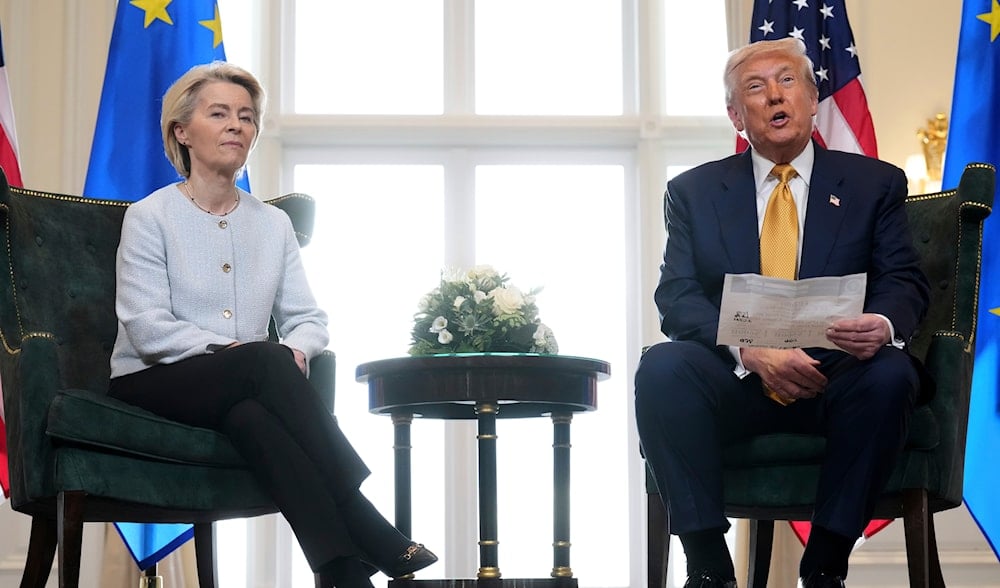US, EU finalize major trade deal with zero tariffs on US imports
President Trump announces a US-EU trade deal featuring zero tariffs on US imports, a 15% tariff on EU goods, $750 billion in EU energy purchases, and major investment pledges.
-

President Donald Trump reads from a paper and European Commission President Ursula von der Leyen listens after reaching a trade deal between the US and the EU at the Trump Turnberry golf course in Scotland, July 27, 2025. (AP)
The United States and the European Union have finalized a new trade agreement that introduces significant changes to transatlantic commerce, US President Donald Trump announced on Sunday.
According to Trump, the deal includes a zero tariff on all US imports to European markets, while establishing a 15% baseline tariff on EU goods entering the US, including automobiles.
"I just want to congratulate you. I think it is great that we made a deal today instead of playing games and maybe not making a deal at all … I think it is the biggest deal ever made," Trump said during a meeting with European Commission President Ursula von der Leyen in Scotland.
Trump stated that under the terms of the agreement, the EU will purchase $750 billion worth of US energy and an unspecified but “vast amount” of military equipment from the United States. Additionally, the deal includes a pledge by the EU to invest $600 billion in the US economy.
As part of the agreement, both parties have agreed to open their markets to trade under revised conditions, with zero tariffs applying to US imports into Europe. The deal is positioned as a cornerstone of a renewed economic partnership between the two transatlantic allies.
Deal 'unbalanced'
France's European Affairs Minister Benjamin Haddad reacted to the deal early on Monday, saying it had some merits, such as exemptions for some key French business sectors, but was "unbalanced".
"The trade agreement negotiated by the European Commission with the United States will bring temporary stability to economic actors threatened by the escalation of American tariffs, but it is unbalanced," wrote Haddad on X.
L’accord commercial négocié par la Commission Européenne avec les Etats-Unis apportera une stabilité temporaire aux acteurs économiques menacés par l’escalade douanière américaine, mais il est déséquilibré.
— Benjamin Haddad (@benjaminhaddad) July 28, 2025
Il a le mérite d’exempter de tarifs des secteurs clés pour l’économie…
Read more: Trump threatens sweeping tariffs, urges EU to fund Ukraine aid
European firms growing more dependent on China
This came after a key business group noted that European multinationals are increasingly dependent on China to maintain their competitiveness, as leaders from the European Union and China gather for a summit aimed at addressing the growing trade tensions between the two sides.
“In order to have the best product at the most attractive price, you obviously need to source the components where you get the best components at the most attractive price. And in many, many cases, that is here in China,” President of the European Union Chamber of Commerce in China, Jens Eskelund, stated.
“So we see actually in many ways that European business is becoming not less dependent, but perhaps more dependent on China,” Eskelund told Bloomberg in a Thursday interview.
The remarks coincided with high-level EU talks in Beijing with President Xi Jinping, as mounting tensions over the Ukraine war and trade frictions overshadowed the visit, with China’s restrictions on rare earth magnet exports hitting European carmakers and Brussels’ latest sanctions on Chinese firms over ties to Russia deepening the diplomatic rift.
During the tense one-day summit with Chinese President Xi Jinping marking 50 years of diplomatic ties, European Commission President Ursula von der Leyen called for a fundamental shift in trade relations between the European Union and China, stressing the need for greater balance in the face of growing economic tensions.
Read more: Trump blindsides EU in trade talks, repeats global deceptive patterns

 3 Min Read
3 Min Read










